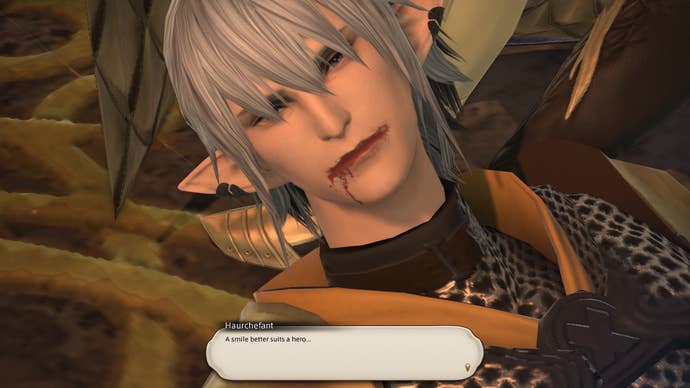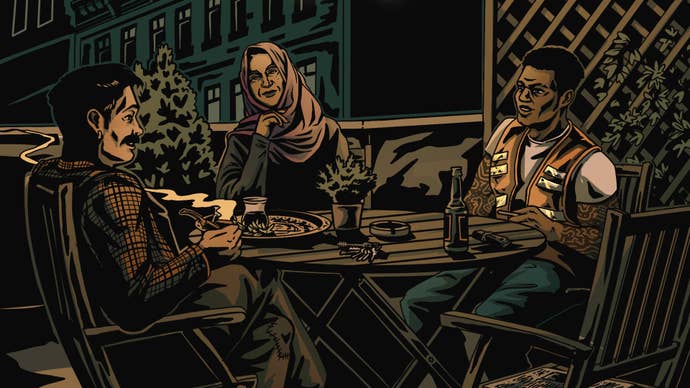Hello! Eurogamer’s week of features celebrating the intersection of queer culture and gaming continues today as Caelyn Ellis discovers what games can teach us about taking action – and making a difference – in the real-world. To catch up on everything you might have missed this year and in Pride Weeks past, you can visit our Pride Week hub.
Writing about games feels increasingly difficult these days. The world seems to be going down the crapper and I can’t look at the news or open social media without encountering myriad ways in which people are suffering unnecessarily. I’m fortunate in that the worst of it doesn’t affect me directly; I’m not, for example, a resident of Palestine. I am a trans woman in the UK though, and you may have noticed that things haven’t been great for us recently.
This isn’t a new phenomenon. I’ve been out for well over a decade, and have witnessed things get steadily worse for some time now. The one-two punch of Brexit and Donald Trump’s first victory felt like a turning point. Things had been slowly getting better, but that was all over. It was like cresting a hill and seeing the long, steepening downhill slope ahead. That still wasn’t sufficient preparation for the cliff we went over in April, when the UK Supreme Court made a ruling on the definition of “woman” and “sex” in the Equality Act.
Despite assurances from legal experts and the Supreme Court itself that the ruling very specifically applied to the Equality Act wording only and was limited in scope, this was a signal for transphobes everywhere – from politicians, to shitty authors, to random thugs hopped up on right-wing media propaganda – to start putting the boot in, figuratively and literally. As usual, trans women have had the worst of it, demonised as we are; trans men are an afterthought, and non-binary people may as well not exist. Intersex folks are, of course, studiously ignored, since their mere existence highlights the glaring flaws in transphobes’ remedial understanding of “biological sex”.
The whole situation is, to be frank, bloody terrifying and like many people in difficult times, I turn to games as an escape. My partner and I have been deep into Final Fantasy 14 again, enjoying the visceral pleasures of a world where you can defeat evil by hitting it with a big axe and no-one sees that as a problem. Monster Train 2 has been wonderful for monopolising my thoughts for a while, defending both my train and my brain from invaders, too tangled in the intricacies of deck-building to worry about anything else. The last week or so has seen me journeying into the deserts of Arrakis, as Dune: Awakening has firmly grabbed my attention and had me building castles in a big sandpit for my friends and I to enjoy.
But games can provide more than escapism.

You may have noticed that this is my first appearance on Eurogamer for some time. This isn’t because of any heinous crimes on my part, but because I now have a day job writing about tabletop games over at Rascal News. As part of my work there, I got to check out a new RPG called Mad As Hell, an urban horror kinda thing about fighting demons which are literally spawned by capitalism. It isn’t a particularly original premise – using monsters to critique social ills is hardly the bleeding edge – but its unique selling point is that it’s explicitly designed to give you the mindset for real-world political organising.
Defeating demons in Mad As Hell does require direct confrontation to actually slay the beast, but the player characters also have to fix the underlying problem that caused the demon to exist in the first place. Short term triage and long term solutions. In the scenario I participated in, the local council had turned off swathes of streetlights as part of a cost-cutting measure, creating a demon of icy darkness that stole the sight of its victims. Our group of Radicals encouraged locals in affected areas to leave lights on at night, while kickstarting a campaign to put pressure on the council to reverse the changes.
The realisation our group had was that what we were doing wasn’t fundamentally any different to how we’d approach any other RPG scenario. We figured out what we needed to do and divvied up tasks based on our characters’ skillsets. Those who were social animals went door to door, chatting to local residents; the computer nerd hit up the socials to spread the word, while others investigated the demon, or obtained the materials we’d need to defeat it in combat. We came together to fight, to support each other and to recuperate. Replace penny-pinching councillors with the machinations of malevolent mages, our Radicals with some adventurer types, and the mean streets of modern Nottingham with, uhh, Fantasy Nottingham and we may as well have been playing a typical fantasy RPG.

Connecting the dots between the real-world political organisation portrayed in Mad As Hell and the sort of fantasy adventuring shenanigans found in a more traditional RPG resulted in minor epiphany. I’ve always believed that games are important. Hackneyed debates about video games being art or not are, to my mind, irrelevant. Games don’t need to be art to justify their existence. However, I still subconsciously put a barrier between games that are important and relevant to the real world and those that are just for fun, whose value lay in entertainment and escapism. I have torn down that barrier.
As I said before, writing about games has been difficult recently. When Eurogamer approached me to contribute to Pride Week again, I knew I wanted to participate, but I didn’t know what to write. It didn’t seem to be enough to celebrate queer identities through the lens of video games, and I certainly didn’t feel like writing anything too personal and opening up when I already felt much too exposed. Right now, queer people, particularly trans people, are under attack. We need more than allies; we need accomplices, defenders and, at the risk of sounding a little trite, we need heroes.
Heroes like you already know how to be. In the wake of the Final Fantasy Tactics remake being announced, writer Yasumi Matsuno published a statement touching upon both the circumstances that he originally created the story in, and how it is relevant in 2025 “when inequality and division are still deeply rooted in our society.” It puts paid to the idea that older games, or games from Japanese developers, are apolitical in nature, and it explicitly invites you to draw on the game for inspiration in these troubled times.
I’m asking you to take this further and let games inspire you to take action. There are so many things you can do to help people in need: the little things you can do from whatever device you’re reading this on, like signing petitions, or simply staying informed; more overt action, like joining marches and protests; supporting marginalised people, through patronising our businesses, donating to our crowdfunders, or just checking in on folks you know to see if they need help. I recently came across this video from Oslo Pride that demonstrates how simply showing queer folks that they’re safe around you can make a huge difference. At a time when trans people can’t even reliably go to the toilet in peace and safety, all these actions and more are vital.
You may think I’m being hyperbolic or sensationalist, and I truly wish that was the case. Businesses are already pulling their support from Pride. Jagex is reportedly pulling back on Pride celebrations in Runescape because they’re supposedly “controversial.” We’ve been surrounded by Rainbow capitalism for so long, that many younger folks haven’t known anything else, let alone the dark days of Section 28, when schools in the UK were forbidden from teaching about homosexuality, denying a generation of queer kids the support they needed. I’m asking for your support now because by next year it may be too late.
Remember, the first Pride was a riot.







